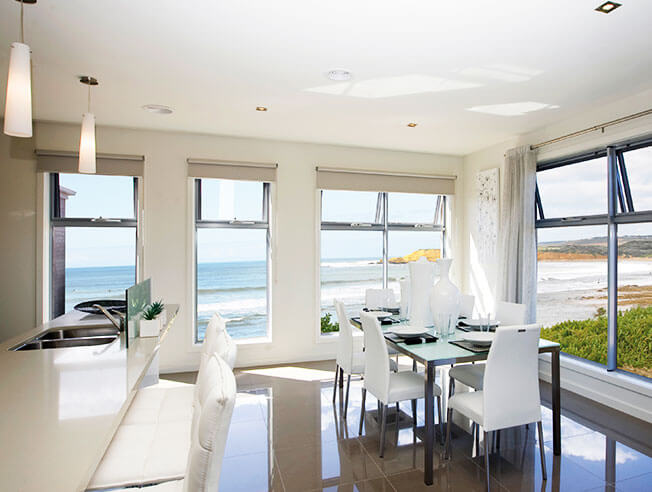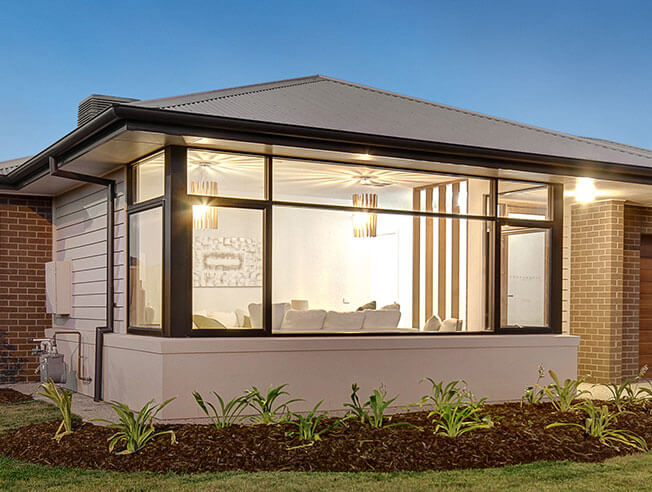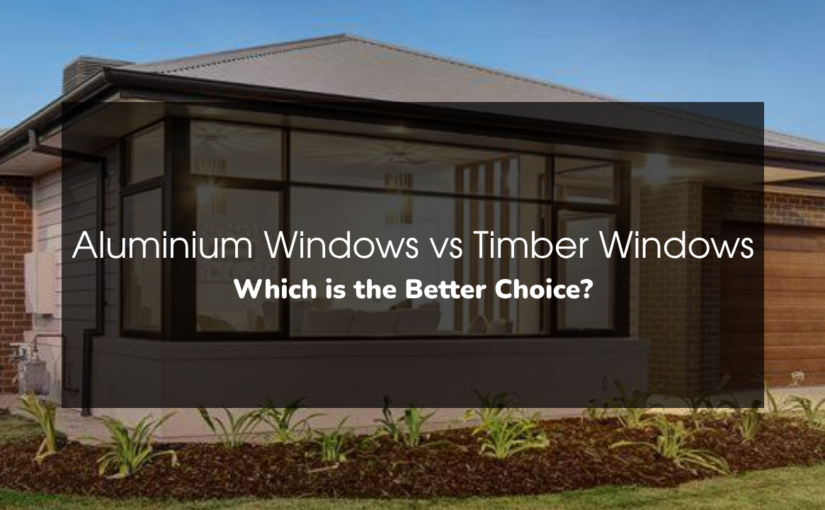When it comes to choosing windows for your home or business, the decision between aluminium and timber can be a difficult one. Both materials have their unique advantages and disadvantages, making the choice far from straightforward. In this article, we will explore the differences between aluminium and timber windows, including their durability, maintenance, thermal efficiency, aesthetic appeal, and environmental impact.
Aluminium windows are known for their durability and low maintenance requirements. They are resistant to corrosion and weathering, making them ideal for harsh climates. However, they are not as aesthetically pleasing as timber windows and may not blend in with certain architectural styles. On the other hand, timber windows offer a classic, natural look that can complement a wide range of building designs. They require more maintenance than aluminium windows, but with proper care, they can last for decades.
Overall, the choice between aluminium and timber windows depends on your specific needs and preferences. In the following sections, we will delve deeper into the pros and cons of each material, so you can make an informed decision that meets your requirements.
Key Takeaways
- Aluminium windows are low maintenance and durable, but may not be as aesthetically pleasing as timber windows.
- Timber windows offer a classic, natural look that can complement a wide range of building designs, but require more maintenance than aluminium windows.
- The choice between aluminium and timber windows ultimately depends on your specific needs and preferences.
Overview of Aluminium Windows

Aluminium windows are a popular choice for homeowners and builders due to their durability, low maintenance, and affordability. Aluminium is a lightweight material that is resistant to rust, corrosion, and weather damage, making it ideal for use in windows.
One of the main advantages of aluminium windows is their low maintenance requirements. Unlike timber windows, which require regular care to stay functional, aluminium windows need minimal attention throughout their lifespan. They are also easy to clean and maintain, making them a popular choice for busy homeowners.
Another advantage of aluminium windows is their affordability. They are often less expensive than timber windows, making them a cost-effective choice for those on a budget. Additionally, aluminium windows are energy-efficient and can help to reduce heating and cooling costs in the home.
Aluminium windows are available in a range of styles and finishes, making them a versatile choice for any home. They can be powder-coated in a variety of colours to match the style of the home, and can be custom made to fit any window opening.
Overall, aluminium windows are a durable, low-maintenance, and cost-effective choice for homeowners and builders. They offer a range of advantages over timber windows, making them a popular choice for those looking for a modern, energy-efficient window solution.
Overview of Timber Windows

When it comes to choosing windows for your home, timber windows are a popular choice for their natural beauty and warmth. Timber windows are made from wood, which is a renewable resource, making them an eco-friendly option. In addition, timber windows can be customized to suit your home’s style and design, as they can be painted or stained to match the colors of your home.
One of the benefits of timber windows is their energy efficiency. Timber is a natural insulator, which means that it can help keep your home warm in the winter and cool in the summer. This can help reduce your energy bills and make your home more comfortable.
However, timber windows do require more maintenance than other window materials, such as aluminium. They need to be regularly painted or stained to protect the wood from the elements, as well as to maintain their appearance. Failure to do so can result in the wood warping, cracking or rotting.
Another consideration when choosing timber windows is their durability. While timber windows can last for many years if properly maintained, they are more prone to damage from moisture, insects, and other environmental factors than other window materials.
Overall, timber windows are a beautiful and energy-efficient option for homeowners who are willing to invest the time and effort into their maintenance.
Durability and Maintenance
When it comes to durability and maintenance, both aluminium and timber windows have their own advantages and disadvantages. Here is a breakdown of each:
Aluminium Windows Durability
Aluminium windows are known for their durability and strength. They are resistant to rust, corrosion, and weathering, making them ideal for areas with harsh weather conditions. Aluminium windows are also less likely to warp or crack over time, which means they require less maintenance than timber windows.
Another advantage of aluminium windows is that they are fire-resistant, making them a safer option for homes and businesses. They are also more energy-efficient than timber windows, which can help reduce energy bills over time.
Timber Windows Durability
Timber windows are known for their natural beauty and warmth, but they require more maintenance than aluminium windows. Timber windows are prone to warping, cracking, and rotting over time, especially if they are not properly sealed and maintained.
However, if maintained properly, timber windows can last for decades. They can also be repaired easily if damaged, which can save money in the long run. Timber windows are also a more sustainable option than aluminium windows, as they are made from a renewable resource.
In conclusion, both aluminium and timber windows have their own strengths and weaknesses when it comes to durability and maintenance. It ultimately comes down to personal preference and the specific needs of your home or business.
Thermal Efficiency
When it comes to choosing between Aluminium and Timber windows, thermal efficiency is an essential factor to consider. Windows are a significant source of heat loss and gain in a building. Therefore, it is crucial to choose windows with high thermal efficiency to reduce energy consumption and increase comfort.
Aluminium Windows Efficiency
Aluminium is an excellent conductor of heat, and as a result, aluminium windows have a high thermal conductivity. This means that aluminium windows can quickly transfer heat from the inside of the building to the outside, resulting in a loss of heat during the winter months. However, modern aluminium windows come with thermal breaks, which are insulating materials placed between the interior and exterior of the frame to reduce heat transfer.
Aluminium windows with thermal breaks have a lower U-value, which is a measure of the rate of heat loss through a window. Therefore, aluminium windows with thermal breaks are more thermally efficient than those without. Additionally, aluminium windows are durable and low maintenance, making them a popular choice for commercial buildings.
Timber Windows Efficiency
Timber windows are known for their natural insulation properties. Timber is a poor conductor of heat, which means that timber windows have a low thermal conductivity. This makes them excellent at retaining heat inside the building during the winter months.
Timber windows are also available with double or triple glazing, which further improves their thermal efficiency. Double or triple glazing consists of two or three panes of glass with a layer of air or gas between them. This layer of air or gas acts as an insulator, reducing heat transfer through the window.
Moreover, timber windows are eco-friendly and sustainable, making them a popular choice for residential buildings. However, timber windows require regular maintenance, and their lifespan is shorter than that of aluminium windows.
In summary, both Aluminium and Timber windows can be thermally efficient when designed and installed correctly. Aluminium windows with thermal breaks have a lower U-value, while Timber windows have natural insulation properties. The choice between the two depends on personal preference, budget, and the building’s requirements.
Aesthetic Appeal
When it comes to choosing between aluminium and timber windows, one of the most important factors to consider is their aesthetic appeal. Both materials have their unique characteristics that can add to the overall look of your home. Let’s take a closer look at the aesthetics of aluminium and timber windows.
Aluminium Windows Aesthetics
Aluminium windows have a sleek and modern appearance that can complement contemporary home designs. The frames are available in a range of colors, allowing you to choose a shade that matches your home’s exterior. Additionally, aluminium frames can be powder-coated, which makes them more durable and resistant to fading and corrosion.
One of the biggest advantages of aluminium windows is their slim frames. The frames are thinner than timber frames, which means they allow more natural light into your home. This can make your living spaces feel brighter and more spacious.
Timber Windows Aesthetics
Timber windows have a classic and timeless look that can add warmth and character to your home. They are available in a range of wood types, including oak, mahogany, and pine, which can be stained or painted to match your home’s decor. Timber frames can also be customized to fit any size or shape of window.
One of the main advantages of timber windows is their natural insulation properties. Timber frames are excellent at keeping out the cold and retaining heat, which can help reduce your energy bills. Additionally, timber frames have a natural grain pattern that can add to the overall aesthetic appeal of your home.
In conclusion, both aluminium and timber windows have their unique aesthetic appeal. Aluminium windows have a modern and sleek appearance, while timber windows have a classic and timeless look. Ultimately, the choice between the two comes down to personal preference and the overall style of your home.
Environmental Impact
When it comes to choosing between aluminium and timber windows, it is important to consider their environmental impact. Both materials have their pros and cons, and it is up to us to weigh them against each other and make an informed decision.
Aluminium Windows Impact
Aluminium is a highly durable and long-lasting material that requires little maintenance. However, its production process is energy-intensive, and it has a high carbon footprint. The mining and refining of bauxite, the primary raw material used in aluminium production, requires a significant amount of energy and releases greenhouse gases into the atmosphere. Additionally, the transportation of aluminium products from the manufacturing facility to the installation site also contributes to its carbon footprint.
Moreover, aluminium is a poor insulator and conducts heat and cold, which makes it less energy-efficient than timber. However, modern aluminium frames often come with thermal breaks to improve insulation.
Timber Windows Impact
Timber is a renewable resource that has a lower carbon footprint than aluminium. It is also a good insulator and can help reduce energy consumption in buildings. Additionally, responsible timber window manufacturers make it a point to source their wood from sustainably managed forests.
However, timber windows require regular maintenance to prevent rot and decay, which can be time-consuming and costly. Moreover, the production and transportation of timber products also contribute to its carbon footprint.
In conclusion, both aluminium and timber windows have their environmental impact, and it is up to us to make an informed decision that takes into account our specific needs and priorities.
Conclusion
After researching and comparing the pros and cons of aluminium windows and timber windows, we have come to the following conclusions:
- Both materials have their advantages and disadvantages.
- Aluminium windows are low maintenance, durable, and energy-efficient. They are also less expensive upfront and have a modern look.
- Timber windows are aesthetically pleasing, offer better insulation and soundproofing, and can be repaired if damaged. They also have a natural, warm look that complements traditional or rustic homes.
- The choice between aluminium and timber windows ultimately depends on personal preference, budget, and the style of the home.
- Homeowners who prioritize low maintenance and affordability may prefer aluminium windows, while those who want a classic, timeless look and superior insulation may prefer timber windows.
- It is important to consider the climate and location of the home when choosing between aluminium and timber windows, as well as the level of maintenance required for each material in that environment.
- Ultimately, the decision between aluminium and timber windows is a personal one that should be based on individual needs and preferences.
In summary, both aluminium and timber windows have their strengths and weaknesses. It is important to carefully consider the factors that are most important to you when choosing between the two materials. Whether you choose aluminium or timber windows, it is important to invest in high-quality products that will provide long-lasting performance and enhance the value and comfort of your home.

